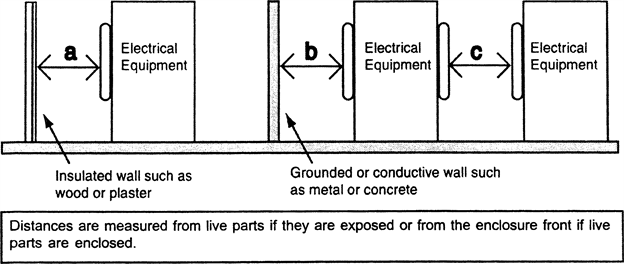PDFWAC 296-800-28027
Working space around electrical equipment.
This section applies to equipment that operates at 600 volts or less.
(1) You must provide and maintain sufficient access and working space around all electrical equipment to permit ready and safe operation and maintenance of the equipment.
(2) You must make sure equipment likely to require examination, adjustment, servicing, or maintenance while energized has:
(a) Working space in front of the equipment that is equal to the width of the equipment or thirty inches, whichever is greater.
(b) Sufficient working space to permit equipment doors or hinged panels to open at least 90 degrees.
(c) Working space in the direction of access to live parts that is not less than that listed in Table XX. Distances are measured from the live parts if they are exposed or from the enclosure front or opening if they are enclosed.
(d) Clear working space about service equipment, switchboards, panelboards, or motor control centers that extends from the grade, floor, or platform to a height of:
(i) 6.25 Feet for installations built before August 13, 2007.
(ii) 6.5 Feet for installations built on or after August 13, 2007. If the height of the equipment is greater than 6.5 feet, the minimum headroom may not be less than the height of the equipment.
Note: | • Other equipment associated with the electrical installation and located above or below the electric equipment may extend not more than 6 inches beyond the front of the electric equipment. |
(3) You must make sure working space is:
(a) Not used for storage.
(b) Suitably guarded when normally enclosed live parts are exposed for inspection or servicing in a passageway or general open space.
(4) You must provide at least one entrance of sufficient area to give access to the working space about electric equipment.
(5) You must provide adequate lighting (WAC 296-800-210) for all working spaces about service equipment, switchboards, panelboards, and motor control centers installed indoors. In electric equipment rooms, the illumination must not be controlled by automatic means only.
This table shows the area you must keep clear depending on the layout of the electrical equipment.
Table XX
Conditions2 | Minimum Clear Distance3 | Minimum Clear Distance3 | |||
0 - 150 volts to ground | 151 - 600 volts to ground | ||||
A1 | 3 ft. | 3 ft. | |||
B | 3 ft.1 | 3 1/2 ft. | |||
C | 3 ft. | 4 ft. | |||
1. | Minimum clear distances may be 0.7 m (2.5 ft) for installations built before April 16, 1981. |
2. | Conditions A, B, and C are as follows: |
A = Exposed live parts on one side and no live or grounded parts on the other side of the working space, or exposed live parts on both sides effectively guarded by suitable wood or other insulating material. Insulated wire or insulated bus bars operating at not over 300 volts aren't considered live parts. | |
B = Exposed live parts on one side and grounded parts on the other side. | |
C = Exposed live parts on both sides of the workspace (not guarded as provided in condition A with the operator between the panels). | |
3. | Working space is not required in back of assemblies such as dead-front switchboards or motor control centers where there are no renewable or adjustable parts (such as fuses or switches) on the back and where all connections are accessible from locations other than the back. Where rear access is required to work on deenergized parts on the back of enclosed equipment, a minimum working space of 30 in. horizontally must be provided. |
 |